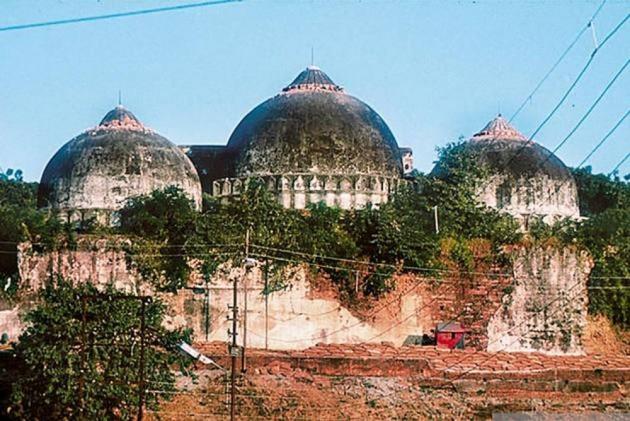Anxiety Grips Ayodhya; Locals More Wary of ‘Outsider Trouble’

Image Courtesy: Outlook India
New Delhi: Amid high security arrangements and efforts to maintain peace and harmony, an uneasy calm prevails in Ayodhya ahead of the Supreme Court’s judgment on the decades-old Babri Masjid-Ramjanambhoomi title dispute case that may be pronounced any day now.
There are reports of residents of Ayodhya and its surrounding regions stocking up rations and other essentials, apprehending violence after the verdict.
Some families are reportedly even shifting women and children to “safer” places. There are also reports of cancellation of marriage ceremonies and shifting of venues.
Confirming this, Md Mujeeb, a resident of Tehri Bazar, said, “The situation is no doubt worrisome. People are making all the preparations they can — from stocking up rations and other necessary items to shifting family members to safer places.”
Mujeeb runs a footwear shop at Ramkot area in front of the disputed site. He says learning from past experiences, he too has stocked up food items and other essentials in case of imposition of curfew.
“I lost everything I had in the communal riots after the demolition of Babri Masjid (mosque) in 1992. My home was torched and vandalised. Whatever I had saved, purchased and arranged for the wedding of my daughter was looted and destroyed. I, along with my family members, ran away with only Rs 300. We had to spend a month in a madarsa (Islamic seminary) at Durahi Kuan,” he told Newsclick.
Though overtly the situation seems normal, the high security arrangements made by the district administration and the state government is causing some anxiety. Sampurna Nand Bajpai, who lives in Begumpura, admits there is anxiety but felt nothing would happen if the government and the administration focus on maintaining law and order without any bias.
“Restrictions for one community and impunity to the other — as has been observed in the past — will lead to some kind of violence. If the law of the land is exercised without any communal bias, there won’t be any problem,” he said, adding that this time the situation would not go out of control because “the trouble-makers are in power” both in the state and the Centre. He, however, was sceptical about Right-wing fringe groups, “which enjoy impunity” under the current ruling dispensation.
Bajpai said he also feared that if the judgment comes in favour of the Hindu parties, there would be celebrations, processions and objectionable sloganeering, which may lead to violence in minority-concentrated and mixed population areas.
Expressing faith in amity between both the communities who reside in the town, Bajpai said: “The residents of Ayodhya never had problems with one another. No one clashed in the city even in 1992 (post-demolition of the Babri mosque). Whatever happened was the handiwork of outsiders, who came and went on rampage.”
To reiterate his point, he said: “Nothing happened in 2010 when the Lucknow bench of the Allahabad High Court had pronounced verdict and had divided the land in three parts to give it to different parties. Trouble, in fact, starts when outsiders come in. They create chaos.
Meanwhile, the district administration said no processions and celebrations would be allowed at any cost. “Several peace meetings have taken place between religious leaders from both communities. We are making all efforts for confidence-building. All sensitive areas have been identified and surveyed. We have made an elaborate deployment plan. Everything is normal and there is no need to panic,” Ayodhya SSP Ashish Tiwari told Newsclick.
He said all Jan Chaupals were being connected with the police. “A total of 18,000 walls across Ayodhya have been painted with cell phone numbers of officers. Our DG has also launched a mobile phone app wherein 16,000 people (village heads and government officials from the village) have been added from 1,600 villages so that they can be contacted in case of any need. We have also created WhatApp groups in which responsible people and religious leaders have been added for information and to act upon their inputs….We will maintain peace,” Tiwari added.
Despite such assurances, people belonging to the minority community are still apprehensive. Haji Sajid, who runs a tailoring shop at Tehri Bazar, said, “We have lost faith in the government and administration. We don’t feel safe across the country, how can we feel safe in Ayodhya? There is an atmosphere of hate everywhere. Therefore, we are doing whatever we can to ensure our safety and security.”
But, Yugal Kishore Sharan Shastri, the mahant of Saryu Kunj Sita Ram temple in Ayodhya, is confident that no violence will take place this time as the BJP — which was leading the Ayodhya movement that led to the demolition of the Babri mosque — is ruling both the state and the Centre. “If anything happens, they will be held responsible because they cannot escape this time as they are in power in the Centre as well as the state,” he said.
He also refuted reports of any kind of fear among communities. “Ayodhya is known for communal amity. People here live in peace. In 1992, the OBC (Other Backward Classes) and the dalit communities were misguided and used by fringe elements, but this time it is not going to happen. Dalits are no longer going to be used, as they have realised that it is they who face FIRs and police cases and have to suffer,” he said.
But Suman Gupta, a journalist, had a different take. “After the 2013 communal riots in Muzaffarnagar, dalits and OBCs have been made Hindus and are still being used to further the communal divide. Generally, they live in or near Muslim-concentrated pockets.”
Gupta said there was a lot of difference between Ayodhya of 1990s and now. “At that time, there was no hatred against Muslims within the society. But now, the entire society is divided on religious lines. There is a clearly visible anti-Muslim sentiment everywhere. This is extremely worrisome.”
With 700-odd temples and over 500 mosques across Ayodhya and Faizabad, the verdict on the Ayodhya title suit is being seen as a litmus test of the country’s highest court.
Get the latest reports & analysis with people's perspective on Protests, movements & deep analytical videos, discussions of the current affairs in your Telegram app. Subscribe to NewsClick's Telegram channel & get Real-Time updates on stories, as they get published on our website.
























